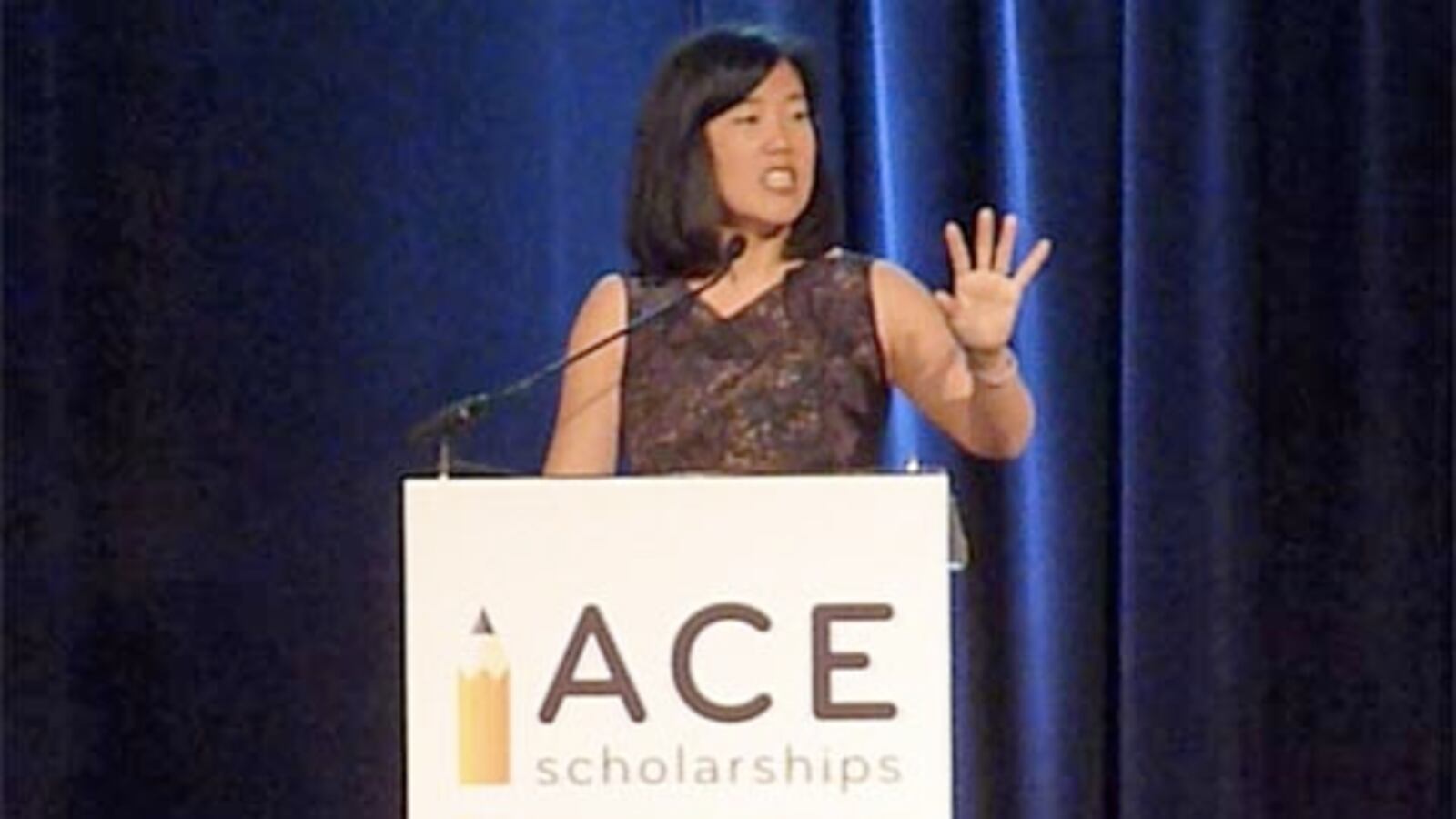Donald Trump’s rounds in search of an education secretary include a meeting this weekend with Michelle Rhee, the former Washington, D.C., schools chief and StudentsFirst founder.
If she is offered and accepts the position, here are five reasonable conclusions we can draw:
1. Trump’s cabinet will contain some diversity of opinion when it comes to undocumented immigrants.
Trump campaigned on promises of ridding the country of people who came here illegally. That includes, he has said, children and young adults who immigrated illegally with their families — people who would be protected by a federal DREAM Act that fell short multiple times in recent years. Rhee came out in favor of the DREAM Act in 2011, citing her direct experience with families who would be protected by it.
“Immigration is not my area of expertise, but I know that the current policy has implications for our education system and isn’t working for kids,” she wrote in a blog post announcing her position. “No child should be forced to live in the shadows and hide their identity, nor should any teacher or mentor have to cover up the truth.”
Many educators have been hoping that the Trump administration will adjust its hard-line position to include amnesty for children brought here by their parents. If Rhee is nominated, she could open the door for the idea to at least get a hearing.
2. Trump meant it when he said he’d champion school choice.
How much is Trump planning to follow through on his campaign promises? In education, one big vow he made was to use federal funds to encourage states to make school choice available to all poor students, including through publicly operated charter schools and vouchers that allow families to take public funding to private schools.
Rhee famously broke with Democratic party dogma three years ago after announcing support for vouchers, so she’s a true believer. If she comes out of her meeting with Trump wanting to serve in his administration, we can assume he convinced her that he plans to move forward with his promises to embrace charter schools and vouchers.
That said, among voucher supporters, Rhee is relatively mild. In a 2012 interview with Education Week, she said she only favors vouchers for low-income students with no high-quality public school options. “This is not about choice for choice’s sake,” she said. Trump’s proposal would offer vouchers to poor families only, but his vice president, Mike Pence, has supported publicly funded private school vouchers for both low- and middle-income families.
3. As for ending Common Core — not so much.
The conservative movement that helped elect Trump cheered when he claimed on the campaign trail that he would end the Common Core standards. The standards are also opposed from the left, by teachers and parents fed up with the tests that standards bring and the test companies that publish them.
Rhee, though, falls with the Obama education reform mainline on this issue: She has strongly supported the Common Core as a path to improving schools for poor children and a way to prepare students for the global economy.
Avoiding the issue in a Trump administration would be relatively easy, complaints from a conservative base aside: Trump did promise to “end” Common Core on the campaign trail. But you can’t repeal something the federal government never actually passed.
4. Urban will still dominate rural — at least when it comes to the education secretary’s most direct experience.
Trump’s support came largely from rural voters, some of whom said the Obama administration hadn’t been attentive to their needs. Indeed, on education, the administration’s leaders did come almost entirely from cities — from Obama’s first education secretary, Arne Duncan, who had led the Chicago public schools, to the current education secretary, John King, who led charter schools in Boston and New York City.
Rhee also grew up in the education world serving big cities. She started in Baltimore, as a Teach For America corps member, then went on to work on urban teacher contract issues by founding The New Teacher Project (now called TNTP), and finally made her national reputation reshaping the public school district in Washington, D.C.
But Rhee has a long relationship with red states, too. StudentsFirst, the advocacy group she founded after leaving D.C., lobbied for laws curtailing seniority protections for teachers. Before it merged with another advocacy group last year, StudentsFirst gained the most traction in states such as Tennessee and Indiana where elected officials were less sympathetic to the concerns of teachers unions.
5. The education reform community Rhee helped to shape will face a new division: how to deal with Trump.
The education reform world as we currently know it arguably settled into place in 2009, when Barack Obama took office and eventually picked one side over the other in a heated debate over the future of public education.
Michelle Rhee was then the fierce chancellor of the D.C. public schools who spent her time firing principals and appearing on national magazine covers with a symbolic broom. In other words, she was the extreme edge of the side Obama picked when he chose Arne Duncan of Chicago as his education secretary and Duncan chose to go all out, if in a friendlier-than-Rhee way, for teacher evaluations and charter schools.
If Trump picks Rhee as his education secretary and she accepts, it could reshape the landscape of the education world again, shifting former allies to opposite sides. Already, we know that some hardcore reformers have come out strongly against any of their own accepting a role in a Trump administration. If Rhee joins the administration, her old friends will have to decide whether to follow that line of thinking and oppose her — or work with her.


